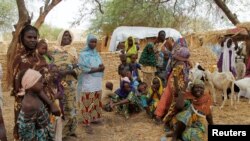Violence in northwestern Nigeria has taken a dangerous new turn, forcing more people to flee for safety in one month than during the course of most of last year.
The U.N. refugee agency says surging attacks in Sokoto, Zamfara and Katsina states has sent an estimated 23,000 people into neighboring Niger. More than 60,000 have crossed the border into Niger since an influx began one year ago.
The U.N. refugee agency UNHCR says people are being attacked and killed by groups of armed men, including herders and farmers fighting over resources, bandits attempting to steal property, and vigilantes carrying out revenge attacks.
UNHCR spokesman Babar Baloch says dozens of civilians have been killed during attacks on villages and local government areas.
He said most of the refugees are desperate, destitute women and children.
“Those fleeing speak of extreme violence unleashed against civilians, murders, kidnappings for ransom, pillaging and looting of villages. Refugees from Nigeria are being allowed to seek protection in Niger despite the border closures measures due to COVID-19,” Baloch said.
The UNHCR says it fears armed incursions inside Nigeria could spill over into Niger. Baloch told VOA insecurity along the border makes it riskier for aid agencies to take care of newly arriving refugees.
“One of our main concern with access and remoteness…is closeness of the area where these refugees have arrived to the border. So, our work is going on with authorities that we are able to move them further inland so they are protected from any further incursions or any other attacks that the armed groups may have had,” he said.
Baloch said some 7,000 refugees are in the process of being moved to safer locations, where they can get water, food, shelter and other essential aid. He said fewer refugees in the border areas will ease some of the pressure on impoverished local communities that have been hosting them.




